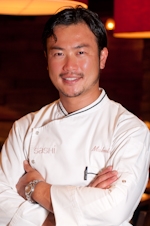Interview with Chef Makoto Okuwa of Morimoto – New York, NY
Antoinette Bruno: Why did you start cooking? Who inspired you to become a chef?
Makoto Okuwa: I was a bad boy. I wanted to either become a carpenter or a chef. But I had an allergy to the outdoors so I chose to be a chef. Also, my mother inspired me. My grandmother used to teach a cooking
AB: Did you attend culinary school?
MO: No, I didn’t go to school. I do recommend school to broaden your knowledge. I hire both cooks with and without culinary school backgrounds.
AB: Who are your mentors? What are some of the most important things you’ve learned from them?
MO: Of course Chef Morimoto is a mentor for me—not just the cooking. It’s more about how to read the customer and what’s going to make him appreciate your food. I learned a lot about presentation from Chef Omai.
AB: What is your philosophy on food and dining?
MO: I think looks are very important, but taste is more important. I want to make my customers feel warm, in a way.
AB: Are there any secret ingredients that you especially like? Why?
MO: I like nitrogen, basil seeds, and shooters, which people usually use in desserts, but which I like to use in savory.
AB: What flavor combinations do you favor?
MO: I like to use dried scallops and dried shrimp juice to make sauces and gelees.
AB: What is your most indispensable kitchen tool?
MO: My Nenox knife, which is made of great material and looks good too, though it’s very expensive.
AB: Is there a culinary technique that you have either created or use in an unusual way?
MO: I make stocks the traditional Japanese way, like a dashi. I take seaweed, dried bonito flakes, and I’m very careful about how I extract the flavor. For example, I experiment with how long I leave in the seaweed before taking it out, to get the best flavor.
AB: What is your favorite question to ask during an interview for a potential new line cook?
MO: How long have you worked with sushi? And, what do you want to learn here?
AB: What tips would you offer a young cook just getting started?
MO: Focus on the fundamentals, not just understanding superficial things. Try to grasp the essence of what you’re doing.
AB: What are your favorite cookbooks?
MO: Senmon Yuri’s Japanese Cooking Magazine contains a lot of new information, techniques, and trends. And Keep It Simple by Alfred Portale has a lot of great techniques too, and style. He knows how to make the ingredients come alive.
AB: What cities do you like for culinary travel?
MO: I like to go to Spain to see new techniques and flavors, and I really want to go to England to eat at The Fat Duck.
AB: What are your favorite restaurants in your city?
MO: Wakamaru has really good sushi. And this noodle bar in St. Mark’s called Momofuku.
AB: What trends do you see emerging in the restaurant industry now?
MO: The Spanish influence is growing very quickly: new techniques as well as tapas portions.
AB: Where do you see yourself in 5 years? 10 years?
MO: I’d like to own my own restaurant.






